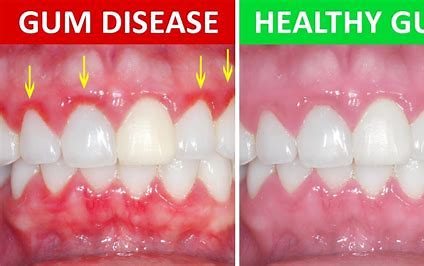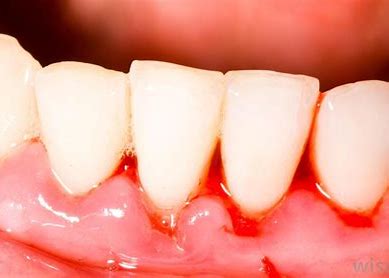What Are Bleeding Gums?
Bleeding gums refer to the condition where the gums bleed when pressure is applied to them, such as while brushing, flossing, or biting on hard food. Bleeding gums are usually caused by inadequate dental hygiene or gum disease. Plaque buildup that is not removed adequately through brushing leads to bacterial growth around the gums, causing inflammation of the gums known as gingivitis. Gingivitis is the most common cause of bleeding gums.
Bleeding gums, also known as gingivitis, is a common dental problem that occurs when the gum tissue becomes inflamed due to bacterial infection. The condition is characterized by red, swollen and bleeding gums. Gingivitis is usually painless, so patients often ignore the symptoms until it gets severe. However, ignoring bleeding gums can lead to periodontitis, which is a more severe form of gum disease that causes the gums to recede and the teeth to loosen.
Other factors that can lead to bleeding gums include hormonal changes, certain medications, vitamin deficiency, or systemic health conditions such as diabetes, leukemia, and scurvy. Flossing or brushing too hard can also cause bleeding gums. In some cases, bleeding gums can be a sign of a serious health issue, and it is recommended to consult a dentist or physician to determine the reason for the bleeding gums.
Related Article – Polish Your Way to a Radiant Smile: A Comprehensive Guide to Dental Cleaning

Causes Of Bleeding Gums
The main cause of bleeding gums is gingivitis, which is a mild form of gum disease caused by plaque build-up along the gum line. Plaque is a sticky film of bacteria that can accumulate on teeth if not removed by brushing and flossing regularly. If left untreated, gingivitis can progress to periodontitis, a more severe form of gum disease that can lead to tooth loss and other health problems.
Other causes of bleeding gums include:
1. Improper brushing and flossing technique: Brushing too hard or using a toothbrush with hard bristles and improper flossing technique can cause damage to the gums and make them bleed.
2. Certain medications: Blood thinners and other medications can affect the blood’s ability to clot and cause the gums to bleed.
3. Hormonal changes: Hormonal changes during pregnancy or menopause can cause the gums to become more sensitive and prone to bleeding.
4. Vitamin deficiencies: A deficiency in vitamin K or vitamin C can weaken the blood vessels and cause the gums to bleed.
5. Systemic health conditions: Certain health conditions, such as diabetes, leukemia, and heart disease, can affect the gums and cause bleeding.
GINGIVITIS VS PERIODONTITIS
Gingivitis and periodontitis are both forms of gum disease. While they have some similarities, they are distinct conditions that affect different parts of the gum and if left untreated, can result in different outcomes.
Gingivitis is the more common and less severe form of gum disease. It affects the gum tissue that surrounds and supports the teeth. It is caused by poor oral hygiene, which leads to the accumulation of plaque and can cause inflammation of the gums. Symptoms of gingivitis include redness, swelling, and bleeding gums. Gingivitis can be reversed with proper dental care, such as regular brushing and flossing, and professional dental cleaning.
Periodontitis is a more advanced form of gum disease that occurs when gingivitis is left untreated. It involves the inflammation and infection of the supporting structures around the teeth, including the bone. It can cause the gums to pull away from the teeth, creating pockets that become infected and lead to tooth loss. Symptoms of periodontitis include persistent bad breath, receding gums, loose teeth, and a change in the way the teeth fit together. Periodontitis requires professional dental intervention to clean the pockets of bacteria and tartar and sometimes surgical procedures.
In summary, gingivitis is a mild form of gum disease that affects the gums only and can be reversed with proper care, while periodontitis is a more severe form of gum disease that causes damage to the structures around the teeth and requires professional intervention to manage.
Differential Diagnosis For Bleeding Gums
If you are experiencing bleeding gums, it is essential to speak with your dentist or dental hygienist to identify the underlying cause and receive appropriate treatment.
There are several conditions or disorders that can cause bleeding gums aside from gingivitis and periodontitis. Some of these include:
1. Blood disorders: Blood disorders such as hemophilia, leukemia, and thrombocytopenia can cause excessive bleeding in the gums.
2. Hormonal changes: Changes in hormone levels during pregnancy, puberty, or menopause can cause the gums to bleed more easily.
3. Nutritional deficiencies: A lack of vitamin C in the diet can cause weak blood vessels and result in bleeding gums.
4. Side effects of medications: Certain medications such as blood thinners, aspirin, and chemotherapy can increase the risk of gum bleeding.
5. Trauma or injury: Trauma to the gums, such as injury from a toothbrush, or dental procedures, can cause bleeding gums.
6. Autoimmune diseases: Certain autoimmune conditions such as lupus, rheumatoid arthritis, and granulomatosis with polyangiitis can cause inflammation and damage to the gums, leading to bleeding.
7. Oral cancer: In rare cases, bleeding gums can be a sign of oral cancer.
If you are experiencing bleeding gums, it is important to speak with your dentist or doctor to determine the underlying cause and receive appropriate treatment.
How To Diagnose?
To diagnose the cause of bleeding gums, a dentist or doctor will typically perform a comprehensive oral examination and consider certain factors, including your medical history and symptoms. They may also order some diagnostic tests to help identify the underlying cause. These may include:
1. Oral examination:
The dentist or doctor will inspect the gums, teeth, and mouth to look for signs of plaque buildup, gingivitis or periodontitis, inflammation, and bleeding.
2. X-rays:
X-rays can help identify if there are any gum or bone loss due to periodontal disease.
3. Blood tests:
Blood tests can assess for underlying health issues, including blood disorders, nutritional deficiencies, or autoimmune diseases.
4. Biopsy:
In some cases, if your symptoms are severe or there are signs of oral cancer, a small tissue sample may be taken for biopsy to confirm the diagnosis.
Your dentist or doctor will use this information to determine the underlying cause of your bleeding gums and recommend the appropriate treatment plan. Treatment may involve good oral hygiene practices, such as brushing and flossing regularly and attending regular dental check-ups, or more comprehensive treatments for gum disease, including scaling and root planing, antibiotic therapy, or surgery.
How To Stop Bleeding Gums
Treatment of bleeding gums usually involves addressing the underlying cause. Here are some common treatments for bleeding gums:
1. Good oral hygiene: Improving your oral hygiene practices can help prevent and treat bleeding gums. This includes brushing twice a day, flossing daily, and using an antiseptic mouthwash.
2. Scaling and root planing: This is a deep cleaning procedure performed by a dental professional. It involves removing plaque and tartar buildup and smoothing out rough spots on the teeth where bacteria can accumulate.
3. Antibiotics: In some cases, antibiotics may be prescribed to treat infections that cause bleeding gums.
4. Nutritional supplements: If your bleeding gums are due to a nutritional deficiency, incorporating more vitamin C into your diet can help strengthen gums and reduce inflammation.
5. Quit smoking: Smoking is a significant risk factor for gum disease, so quitting smoking can help improve gum health.
6. Surgery: In advanced cases of gum disease, surgery may be necessary to remove damaged tissue, reshape the gums or to regenerate bone loss.
It is important to visit a dentist regularly to prevent and address gum problems. Your dentist will recommend the appropriate treatment depending on your condition’s severity and history, which will help you maintain healthy gums and teeth.
Related Article – Polish Your Way to a Radiant Smile: A Comprehensive Guide to Dental Cleaning
Foods That Help Alleviate Bleeding Gums
A healthy and balanced diet can help improve gum health and reduce inflammation, which can help alleviate bleeding gums. Here are some foods that may help relieve bleeding gums:
1. Leafy greens: Spinach, kale, and other leafy greens are rich in vitamin C and calcium, which can help strengthen gums and teeth.
2. Citrus fruits: Oranges, grapefruits, and other citrus fruits are high in vitamin C, which is essential for gum health. However, be sure to rinse your mouth with water afterward as the acid in citrus fruits can erode tooth enamel.
3. Berries: Strawberries, blueberries, and raspberries are rich in antioxidants that can help reduce inflammation and strengthen gum tissue.

4. Milk and yogurt: Dairy products are high in calcium, which can help promote strong teeth and gums.
5. Nuts and seeds: Nuts and seeds are rich in vitamins and minerals that can help reduce inflammation and promote gum health.
6. Ginger: Ginger has anti-inflammatory properties that can help reduce swelling and inflammation in the gums.
7. Green tea: Green tea contains antioxidants that can help reduce inflammation and promote gum health.

While incorporating these foods into your diet can help relieve bleeding gums, it’s also essential to maintain proper oral hygiene practices, such as brushing twice a day, flossing, and attending regular dental check-ups.
How To Stop Bleeding Gums Fast At Home
While it is essential to consult a dentist if you experience bleeding gums, some home remedies can help alleviate the symptoms and promote gum health. Here are some home remedies for bleeding gums:
1. Saltwater rinse:
Mix half a teaspoon of salt in warm water and rinse your mouth with the solution for 30 seconds twice a day. Saltwater can help reduce inflammation and promote healing of the gums.

2. Hydrogen peroxide rinse:
Mix equal parts of 3% hydrogen peroxide and water, rinse your mouth with the solution for 30 seconds, then spit it out. Hydrogen peroxide has antibacterial properties that can help reduce plaque and gingivitis.
3. Aloe vera:
Cut open an aloe vera leaf and apply the gel directly to the gums. Aloe vera has anti-inflammatory and antibacterial properties that can help reduce inflammation and promote healing.

4. Clove oil:
Apply a drop of clove oil directly to the affected gum area. Clove oil has anti-inflammatory and analgesic properties and acts as a natural pain reliever.
5. Oil pulling:
Swish one tablespoon of coconut oil in your mouth for 15-20 minutes, then spit it out. Oil pulling can help remove bacteria and impurities from the mouth, promoting gum health.

It is important to note that home remedies can alleviate symptoms, but they cannot replace professional care. It is essential to maintain good oral hygiene habits, visit the dentist regularly and seek professional help if your condition persists.
FAQ’S For Bleeding Gums
Here are some frequently asked questions and answers for bleeding gums:
Q: What causes bleeding gums?
A: Bleeding gums are usually caused by poor oral hygiene practices, such as not brushing and flossing enough. Other causes include hormonal changes, medication use, vitamin deficiencies, and underlying health conditions, such as gum disease.
Q: When should I see a dentist for bleeding gums?
A: If your bleeding gums persist despite at-home remedies and good oral hygiene practices, you should see a dentist. Additionally, if you experience persistent pain, swelling, or other symptoms, you should seek professional care.
Q: How can I prevent bleeding gums?
A: The best way to prevent bleeding gums is by maintaining good oral hygiene practices, such as brushing twice a day, flossing daily, and using an antiseptic mouthwash. Additionally, eating a balanced diet and quitting smoking can help improve gum health.
Q: Why is gum health important?
A: Gum health is essential for overall oral health and general health. Poor gum health can lead to gum disease, which has been linked to several health conditions, such as diabetes, heart disease, and stroke.
Q: Is bleeding gums a sign of gum disease?
A: Bleeding gums can be a sign of gum disease. It is important to seek professional care if you experience bleeding gums, as early intervention can help prevent gum disease from progressing.
Q: Can bleeding gums be cured?
A: Bleeding gums can be cured with proper treatment and care. Working with your dentist, you can identify the underlying cause of your bleeding gums and develop an appropriate treatment plan to help address the issue.
Related Article – Polish Your Way to a Radiant Smile: A Comprehensive Guide to Dental Cleaning



